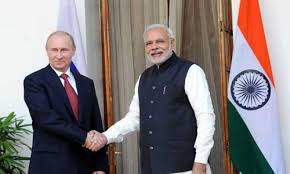India, Russia may sign pact during PM’s Vladivostok trip

India and Russia are expected to sign an agreement during Prime Minister Narendra Modi’s trip to Vladivostok next week that outlines a roadmap to increase bilateral trade manifold and includes a new investment treaty as part of measures to realise untapped potential in economic partnership.
Daily Current Affairs Quiz 2019
Speaking to reporters ahead of Modi’s 4-5 September visit to Vladivostok of Russia, Kudashev strongly backed India’s position on the revocation of Article 370 of its Constitution and added that New Delhi and Islamabad should resolve outstanding issues through dialogue, based on the 1972 Simla Agreement and the 1999 Lahore Declaration.
Modi is to visit Vladivostok to attend the Eastern Economic Forum as well as the annual bilateral summit with Russian President Vladimir Putin. This is the 20th summit between the leaders of the two countries since the year 2000 when the mechanism was institutionalized. The meeting between Modi and Putin next week will be their third this year—previously they met on the margins of the Shanghai Cooperation Organisation meet in the Kyrgyz capital Bishkek and the G20 meet in Osaka.
Indian foreign minister S. Jaishankar is currently in Moscow for meetings with his Russian counterpart Sergey Lavrov to finalize the agenda for Modi’s visit. The two countries are looking to get Indian investment into Russia’s Far East that borders China, a region rich in mineral resources. Earlier this month, commerce minister Piyush Goyal visited the Russian Far East accompanied by the chief ministers of Goa, Gujarat, Haryana and Uttar Pradesh, besides a 140-member strong Indian business delegation.
Russia’s deputy chief of mission in New Delhi, Roman Babushkin added that Russia will be delivering the S-400 air defence missile system to India by 2023 despite the US pressure on New Delhi not to acquire the system.
Russian Trade Commissioner Yaroslav Tarasyuk said India will “soon” make 20% of the payment towards the $5.2 billion missile deal under a new payment mechanism. India has been facing the threat of sanctions by the US for procuring these missiles from Moscow. America has threatened to impose sanctions on India under the CAATSA (Countering America’s Adversaries Through Sanctions Act) legislation. Sberbank of Russia — that has a branch in New Delhi — is to receive the amount in rupees and pay Moscow in ruble under the new payment mechanism. Russia’s VTB Bank which too has a presence in India, is also expected to be engaged for payments made in defence deals between New Delhi and Moscow.
One of the key takeaways expected from Modi’s visit is the signing of a pact for the construction of six nuclear power plants for India. This is apart from the six being set up in Kudankulam in Tamil Nadu. On Kashmir and the abrogation of Article 370, Kudashev said: “India’s decision (on Jammu and Kashmir) is a sovereign decision which is as per its Constitution. Our position on the issue is totally identical to India’s position.”